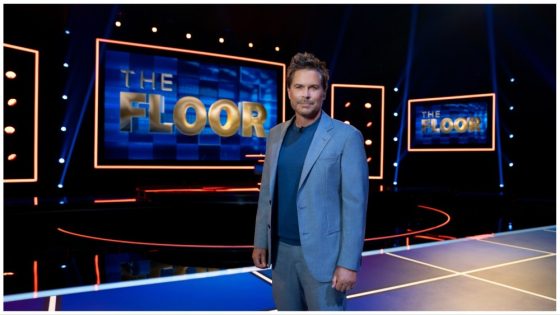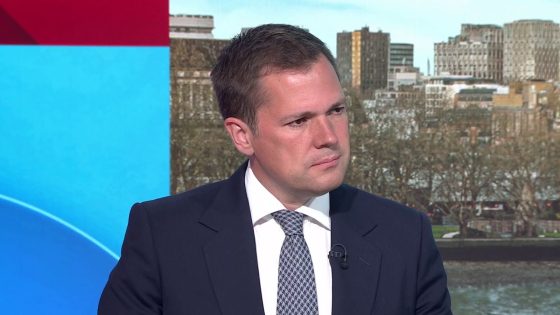Talpa Studios, the company founded by “The Voice” and “Big Brother” creator John de Mol, has closed further territory sales for quiz-show format “The Floor.” Variety can also reveal that the show has been named by research organization K7 Media as the “Format to Watch” in its “Tracking the Giants” format sales report, which was released Saturday at MipFormats. The recognition is based on the show’s territory sales.
K7 said: “’The Floor’ is the best-selling format in 2023 and early 2024 among all the unscripted formats that were newly created in 2023. Therefore, it’s crowned as ‘The Format to Watch.’” The “Tracking the Giants” report spotlights the top 100 travelling unscripted TV formats of the past year.
The show made its debut in the U.S. on Fox in January, hosted by Rob Lowe, and even spawned a parody on “Saturday Night Live.” It debuted with 3.9 million multiplatform viewers in Live + 3 ratings, ranking as Fox’s most-watched unscripted Tuesday debut in 13 years. “The Floor’s” premiere was Fox’s largest total multiplatform audience for an unscripted debut in two years and is also its most streamed game show debut on record.
The show has been sold to 13 markets so far. Variety can reveal that it has just been sold to Portugal, where it has been acquired by public broadcaster RTP, and Israel, where public broadcaster KAN has taken the rights. Other buyers, previously announced, include Atres in Spain, Sat.1 in Germany, Rai2 in Italy, France Television in France, ATV in Turkey, KanalD in Romania, Kuarzo in Argentina, Novy in Ukraine, RTL in Hungary and RTL4 in the Netherlands.
In the fast-paced show, 100 quiz fanatics (in the U.S. this became 81) take each other on in quiz duels on a giant LED floor. The floor is divided into 100 squares (81 in the U.S.), each representing a field of knowledge. Each contestant starts off on their own square, if they win their duel they add the loser’s square or squares to their own territory. The goal is to conquer the entire floor and take home a huge cash prize.
Talpa Studios’ CEO Maarten Meijs and Sebastian van Barneveld, director of global distribution, talk to Variety about the format.
Meijs says that one of the reasons for the show’s success is that it is “highly engaging” and “visually appealing.”
The show made its debut in the U.S. on Fox in January, hosted by Rob Lowe.
Courtesy of Fox
He says: “At any stage of the show, whenever you tune in, you immediately see the top shot of the floor. You see the amount of contestants still playing, and you’re able to chime in at any moment.
“Another important reason is the fact that every duel on the floor is life or death, so if you lose, you’re out. And this is at a very high pace.”
Van Barneveld adds: “There is a tension loop, if you will, that you go from addictive duel to duel, so you keep wanting to watch the next one.
“And then the questions are stacked in a way that draws the viewer in.”
The host is an important participant in the game. Meijs says: “With a show like this, it’s not a static host. It’s a host who can play with characters because it’s a show that’s built on characters.
“What we do is we create heroes and villains on the floor. And that, for a host, is great to play with. And sometimes we see them literally entering the floor as well and questioning the players.
“So, aside from leading the show and the rhythm and the flow, you can also play with the characters and the dynamics of the game as it progresses.”
Van Barneveld adds: “We started out in the Netherlands with a comedian. So, we wanted to keep it light, if you will. And then we found out as we progressed through all the 11 territories that the host is a key factor in all the ways Maarten just indicated, but also that with Rob Lowe, you have an additional layer, because he’s so astute and spontaneous, and he knows how to grip the viewer.”
Van Barneveld adds: “We say the show has a high ‘Game of Thrones’ element, because the characters that are billed as heroes and villains, they can be ousted from the show at any point in time, because every duel is about survival. So, either you’re in or you’re out. And that’s, I think, also a really appealing aspect.”
When casting the players the aim is to reflect society, Meijs says: “We’re looking for a very good representation of the local society because there’s the possibility to have people from all different backgrounds.
“We aren’t casting specialists in a certain genre or in a certain topic. What we supply them with is a list of topics and they can tick a few boxes, and then on the floor, they will find out what their category is. We’re not looking for the brainiest in a certain genre. It’s a level playing field and everybody can defeat the other player.”
Van Barneveld adds: “The only country where we actually had some limitations in the way we cast was in the Ukraine, because all the men are obviously at war over there. But also there, there’s a lot of diversity.”
Meijs says: “That is something we are particularly proud of, because last year, as part of a relief effort for the war, we shot in coproduction with Novy channel, the Ukrainian broadcaster. We shot a version here in our studios in the Netherlands because we wanted to contribute to the well-being of the Ukrainian audience. And so we shot the version here, and the cast was people who fled from Ukraine and also veterans who are here for physical rehabilitation.

Ukrainian broadcaster Novy shot its version in the Netherlands.
Courtesy of Talpa Studios
“There were people with physical disability in other versions too.”
There are ways that the show can be modified. For example, as mentioned, in the U.S. version, they have a different number of squares. Meijs says: “At the end of the day, it should play out well on a 16 by nine screen. In the U.S., we have 81 squares. It has to do with multiple factors, such as the length of the episodes and the series structure, and we can build a breakdown on the basis of that.
“It’s an arc show so that’s also very special for a game show. You have those episodic winners, but at the end of the day, it’s about who actually conquers the floor at the end of the series. And there are not a lot of game shows that have that arc structure.” Most game shows have self-contained episodes.
Van Barneveld adds: “And there will be also daily versions, besides the weekly version, which have really done superbly well in all the markets we’ve launched in up to now. There will be a couple of markets that will start a daily version of the show. We’re very confident that will work as well.”
In the U.S., each season contains 10 episodes, but in the Netherlands, it’s nine. Each territory varies the length of the season, depending on the length of the episodes. In Netherlands, the episodes have gross 90 minutes. In the U.S., it’s a commercial hour. In Germany, it’s two hours and in France slightly longer, but with only four episodes.
Meijs says: “What we do is that we focus on evolving our brands in terms of creativity in order that the show is not predictable, and we’ve already included a few new elements with respect to that. In France, we’ve implemented a feature that we call the Golden Square. So, if you win three duels in a row, your square becomes gold, and you will gain an additional five seconds that at any given moment in time, you can use. When seasons are following up, you need to keep on thinking, ‘How are we going to create surprise elements?’”
Source Agencies



